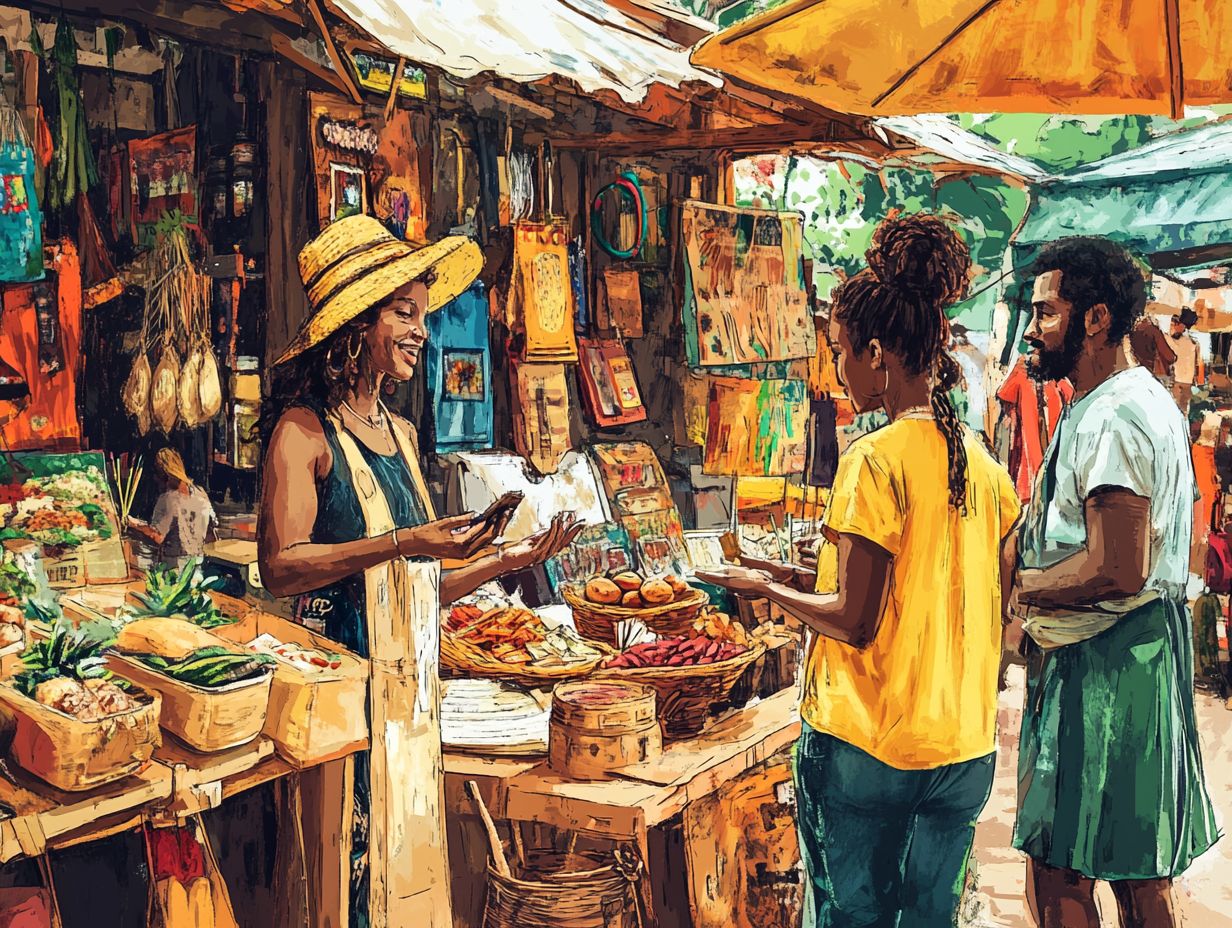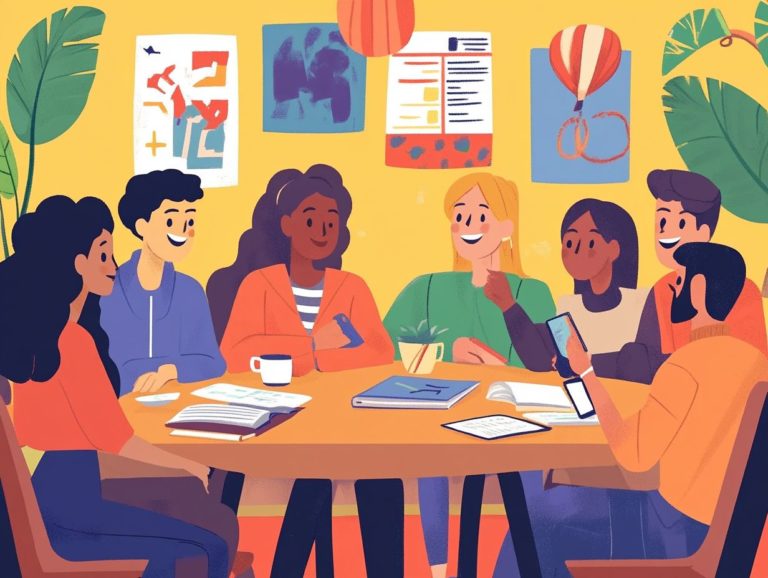how to use local customs to enhance language skills
Incorporating local customs into your language learning journey can elevate your experience from mere vocabulary drills to engaging, vibrant conversations that resonate with the culture.
Grasping cultural norms and immersing yourself in traditions can significantly enhance your language proficiency, making it more meaningful and practical. This article delves into how observing and participating in local customs not only enriches your vocabulary but also cultivates deeper connections with native speakers.
Explore practical tips for weaving these customs into your practice. Witness how they can effectively bridge language barriers, leading to more impactful communication.
Contents
- Key Takeaways:
- The Importance of Immersion in Language Learning
- Understanding Local Customs
- Incorporating Local Customs into Language Practice
- Practicing Language Skills through Cultural Activities
- Overcoming Language Barriers through Understanding Customs
- Tips for Using Local Customs in Language Learning
- Frequently Asked Questions
- What are local customs and how can they help enhance language skills?
- How can I incorporate local customs into my language learning?
- Are there any specific customs or traditions that are particularly helpful in language learning?
- How can local customs help improve my speaking skills?
- Can local customs enhance other language skills, like listening and reading?
- Are there challenges to using local customs for language skills?
- How can local customs help improve my speaking skills?
Key Takeaways:
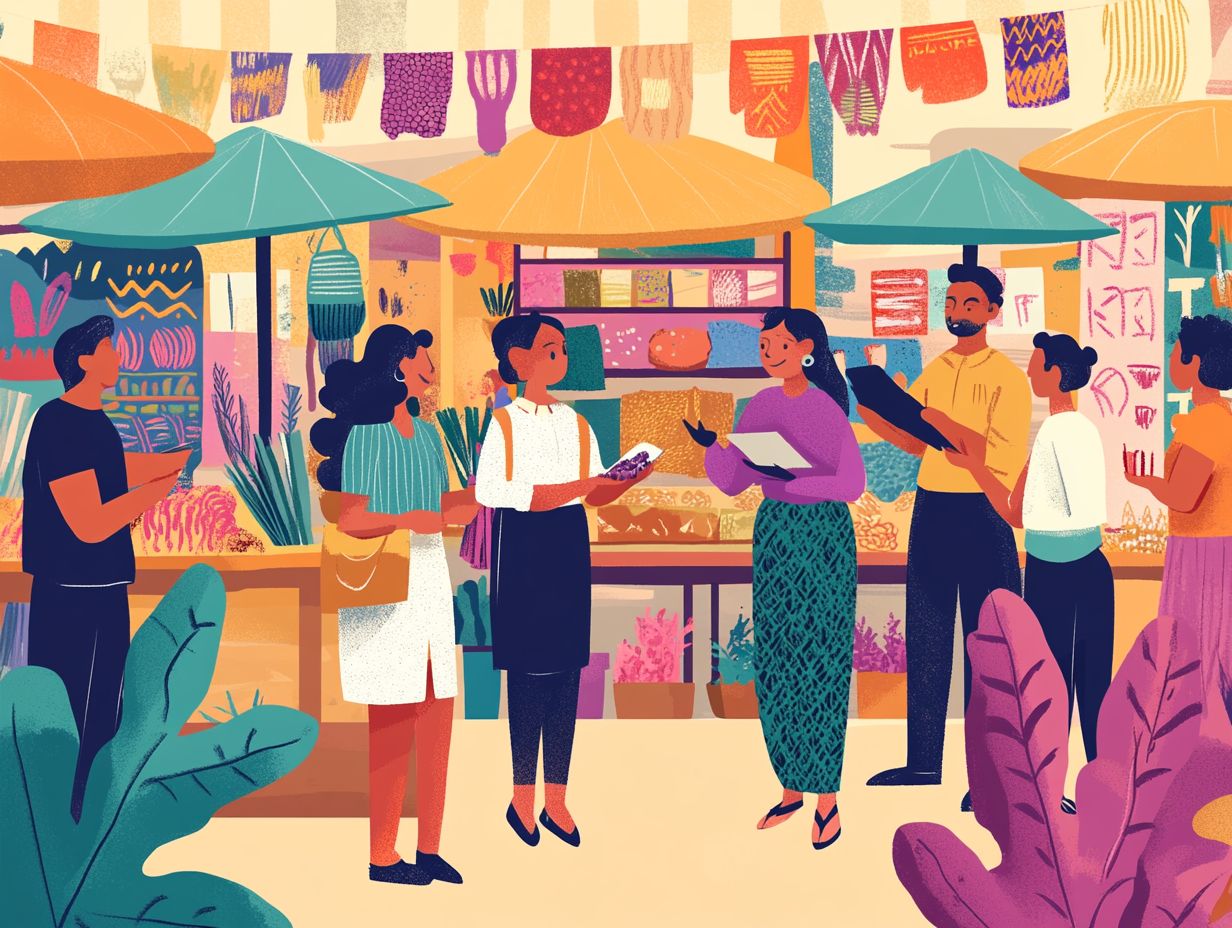
Immerse yourself in the local culture to enhance your language proficiency.
Learn about and incorporate local customs into language practice and conversations.
Participate in cultural activities and events to improve your language skills and understanding of customs.
The Importance of Immersion in Language Learning
Immersion is essential for honing your language skills. It offers authentic resources and experiences that enrich your understanding of both the language and its cultural context.
Engaging with native speakers in real-life situations expands your vocabulary and cultivates global awareness and cultural competence. This makes your learning journey far more effective and meaningful.
Embrace methods like language immersion, community involvement, and cross-cultural communication. You can establish a robust foundation in your target language, whether it s Spanish, Japanese, or any other captivating language from around the world.
Understanding Local Customs
Understanding local customs is essential for you as a language learner. It offers invaluable cultural insights that improve your understanding and practical application of the language.
This knowledge bridges the gap between mere communication and the intricate nuances of culture. Immerse yourself in the customs of the language you re studying to forge meaningful cultural connections that greatly enrich your learning experience.
This depth of understanding can significantly enhance your engagement and retention. Ultimately, it leads to more effective instruction and a profound appreciation for the richness of diverse cultures.
Researching and Observing Cultural Norms
Researching and observing cultural norms is crucial for language learners. It provides the authentic resources needed to navigate social interactions and enhances overall language proficiency.
Understanding the cultural nuances of countries like Germany or Japan helps you grasp the subtleties of the language. You become skilled in cross-cultural communication.
This practice fosters critical thinking and equips you with tools to engage meaningfully in diverse cultural settings. Actively participating in local community events allows for authentic conversations and interactions to flourish.
Language learning apps like Lingopie immerse you in native media, exposing you to cultural intricacies while sharpening your listening skills. Following relevant infographics on platforms like Pinterest offers visual insights into everyday customs and traditions.
By combining these resources, you’ll refine your language abilities and gain invaluable perspectives that solidify your grasp of cultural contexts.
Incorporating Local Customs into Language Practice
Incorporating local customs into your language practice enriches your learning experience and enhances your vocabulary and conversation topics. To further elevate your skills, consider how to utilize public events for language practice, as this exciting approach helps you communicate effortlessly with native speakers!
Integrating cultural elements fosters deeper engagement and understanding, leading to more authentic interactions with the language. Utilize themed-based units and concentrate on relevant vocabulary to cultivate a greater appreciation for the language.
Ultimately, this approach elevates your overall language competence.
Start exploring local customs now and watch your language skills soar!
Conversation Topics and Vocabulary
Selecting conversation topics and relevant vocabulary is an excellent way to bridge language learning with local customs. This allows you to engage in meaningful dialogues that reflect cultural connections.
By utilizing authentic resources like local news articles or videos from YouTube you can develop your language skills while exploring subjects that resonate with your cultural context. This approach enhances your vocabulary and fosters a deeper understanding of the cultural nuances essential in communication.
For example, discussing food traditions in Italy can lead to conversations about regional specialties. Exploring festivals in India provides valuable insights into social practices and values.
Engaging with native speakers, whether through language exchange meet-ups or community events, enriches your experience. By incorporating diverse topics, you become proficient in the local language and appreciate the culture. This ultimately leads to more effective and enjoyable interactions.
Practicing Language Skills through Cultural Activities
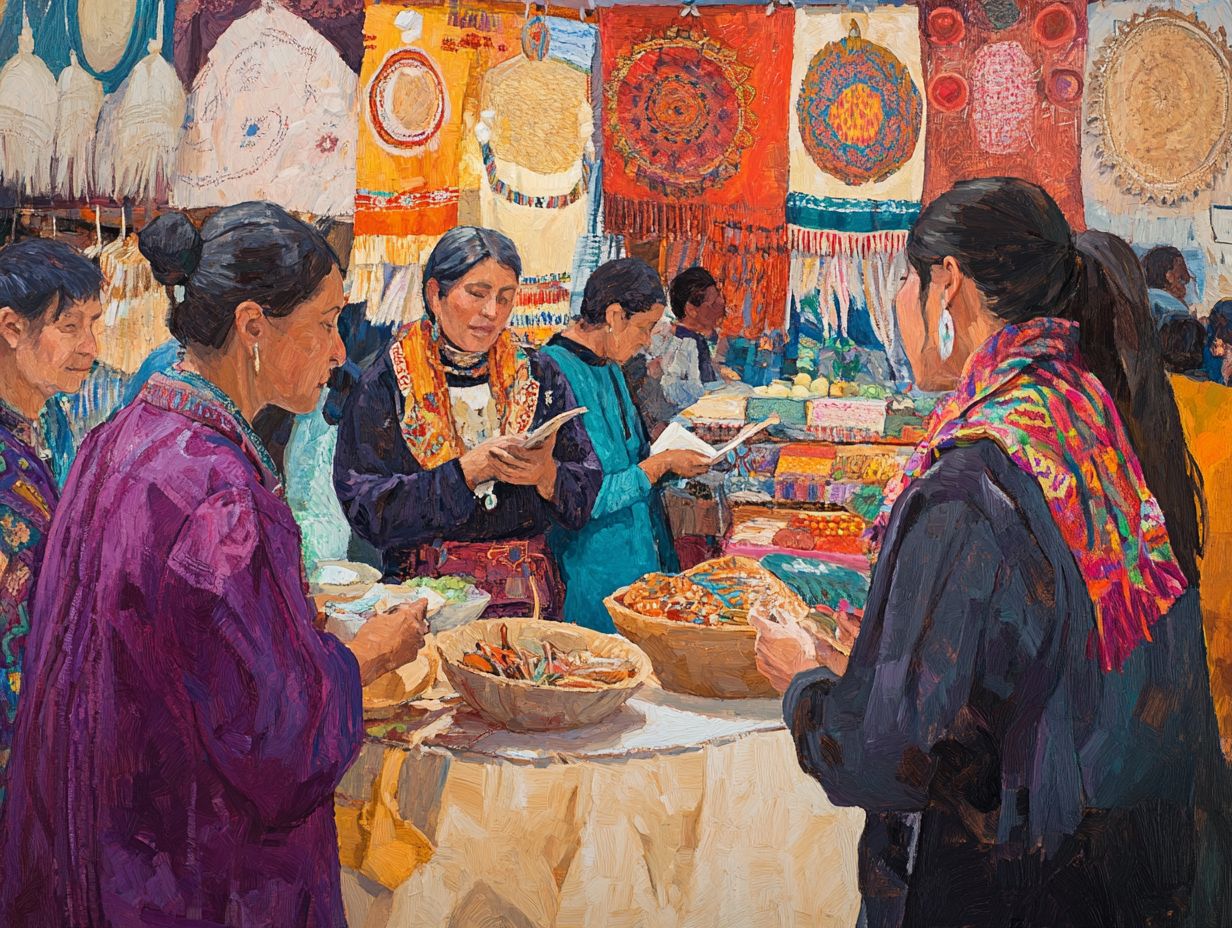
Dive into cultural activities! They re an exciting way to practice your language skills. These immersive experiences elevate your linguistic abilities and cultivate a sense of community.
By immersing yourself in local events and traditions, you can apply your language skills in real-world scenarios. This deepens your understanding of both the language and its cultural nuances.
This lively way of learning encourages you to join in and creates lasting memories, helping you master the language.
Participating in Local Events and Traditions
Participating in local events and traditions presents a remarkable opportunity to immerse yourself in the culture. This enhances your language skills while forging meaningful connections.
These events serve as a practical platform for practicing language in authentic settings. They allow you to engage with the community and witness the language in action.
From vibrant cultural festivals celebrating regional music and dance to traditional celebrations reflecting a community’s unique history, you ll discover countless ways to practice your skills.
Engaging in local markets or community fairs provides informal settings to converse with native speakers, making your learning experience more dynamic and enjoyable.
By immersing yourself in these gatherings, you solidify language patterns and vocabulary while enhancing your cultural competence. This enables you to navigate social contexts with greater ease, enriching your overall educational journey and personal growth.
Overcoming Language Barriers through Understanding Customs
Overcoming language barriers becomes attainable when you cultivate a deep understanding of customs. This offers vital cultural insights that enhance effective communication.
Recognizing and respecting cultural differences sharpens your cross-cultural communication skills and helps you approach conversations with greater confidence.
This awareness fosters more meaningful interactions and elevates your learning experience. It demonstrates that cultural understanding is essential for mastering a new language.
Join a local event today and start speaking the language!
How Cultural Understanding Can Improve Communication
Cultural understanding greatly improves communication skills.
It equips you with the knowledge to navigate social interactions effectively.
By integrating cultural insights into your language learning journey, you can cultivate critical thinking skills that enable you to analyze and adapt your communication style according to different cultural contexts.
This approach boosts your language proficiency and prepares you for effective engagement in various diverse settings.
Engaging in role-playing activities that simulate real-life scenarios allows you to experience cultural nuances firsthand, making your language learning relatable and immersive.
Incorporating authentic materials such as literature, music, and films from various cultures can deepen your appreciation for the language you re studying.
By combining these methods, you connect emotionally with the material, fostering a holistic learning environment that promotes empathy and understanding.
These techniques bridge gaps, allowing you to master not just the language but the art of communication!
Tips for Using Local Customs in Language Learning
Leveraging local customs in language learning, such as how to use local markets for language practice, can elevate your educational experience, fostering effective instruction and enhancing cultural competence.
By weaving local traditions and practices into the curriculum, educators can craft an engaging learning environment that resonates with you.
This strategy motivates you to actively participate in your learning journey and facilitates deeper retention and understanding of both the language and its cultural context.
Maximizing Language Learning Opportunities
Maximizing your language learning opportunities involves tapping into cultural insights and community engagement to craft a rich educational experience.
By immersing yourself in local customs and traditions, you gain a deeper understanding of the language within its cultural context, making your learning journey effective and meaningful.
This proactive approach enhances your language acquisition while cultivating a sense of belonging and appreciation for diverse cultures.
Utilizing immersive programs places you in real-life scenarios, allowing for spontaneous practice and valuable conversations with native speakers.
Building partnerships with local communities can further elevate these experiences, providing avenues for collaboration and exchange.
Engaging with authentic resources like newspapers, films, and music exposes you to colloquial expressions and cultural nuances.
By embracing these active experiences, you re far more likely to achieve fluency, confidence, and a lasting connection to the language you re studying.
Frequently Asked Questions
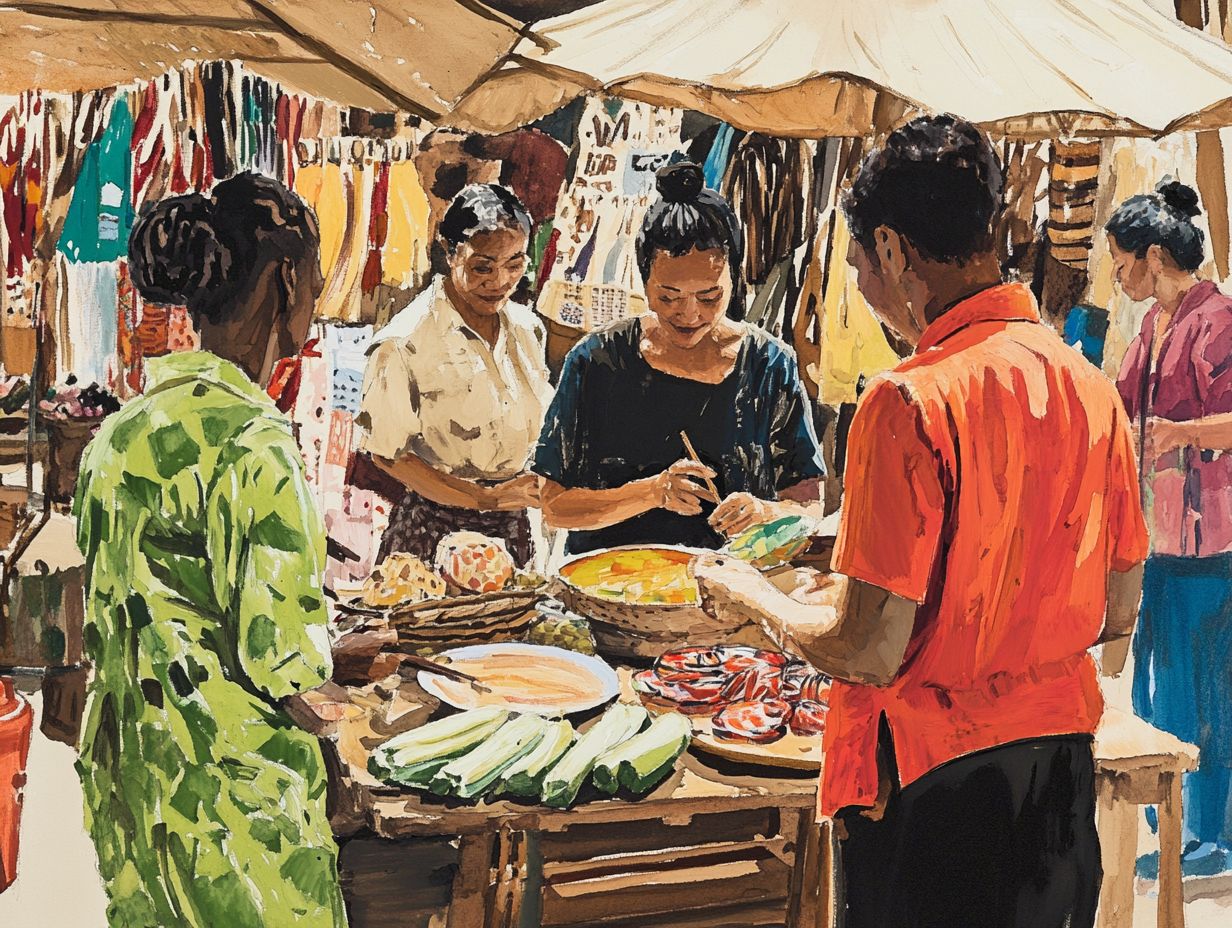
What are local customs and how can they help enhance language skills?
Local customs refer to the traditions, behaviors, and beliefs of a particular community or culture. These customs provide real-life opportunities to practice and use the language in a natural and authentic setting.
How can I incorporate local customs into my language learning?
Immerse yourself in the culture by participating in local events, trying traditional foods, and interacting with native speakers. Reading books or watching movies in the local language can also help you learn more about the customs and traditions.
Are there any specific customs or traditions that are particularly helpful in language learning?
While all customs can provide valuable opportunities for practice, customs involving verbal communication, such as festivals or gatherings, can be especially beneficial. These events offer conversations and interactions, allowing for natural and meaningful language practice.
How can local customs help improve my speaking skills?
Local customs improve speaking skills by providing opportunities to engage in real-life conversations with native speakers. By participating in these customs and traditions, you can practice speaking the language in an authentic way, leading to improved fluency and confidence. For more insights, check out these tips to enhance your language immersion experience.
Start incorporating local customs into your language learning today and experience the difference!
Can local customs enhance other language skills, like listening and reading?
Yes! Local customs can enhance all language skills, including listening and reading. By immersing yourself in the culture and practicing in real-life situations, you can understand spoken and written language much better.
Are there challenges to using local customs for language skills?
Using local customs can be very helpful. However, it’s crucial to be respectful and culturally sensitive.
Do not rely only on customs for language learning. Formal instruction is also necessary for a well-rounded education.
How can local customs help improve my speaking skills?
Local customs offer great chances to engage in real conversations with native speakers. Actively participating in these customs helps you practice speaking naturally, leading to greater fluency and confidence.
